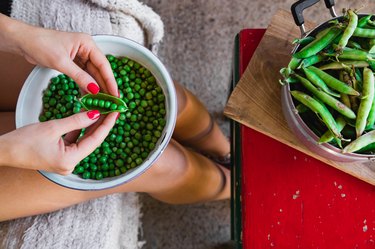
If you have thyroid disease, you may wonder if there's a special diet that can boost the health of your thyroid. In fact, many foods that support good health in general will help every part of your body, including the thyroid. But one specific mineral may have the biggest effect.
Swing Like a Butterfly
Video of the Day
Your thyroid is a butterfly-shaped gland located in the middle of your lower neck. It plays a key role in your body's metabolism, which determines how quickly your cells carry out the tasks they need to do for you to function, according to the Cleveland Clinic.
Video of the Day
The thyroid gland produces hormones that affect every tissue in your body, explains Elizabeth McAninch, MD, an endocrinologist and assistant professor at Rush University Medical Center in Chicago. These hormones must be balanced so that your body doesn't use energy too quickly or too slowly.
Your thyroid can be underactive (hypothyroidism), which means it isn't producing enough thyroid hormone, or it can be overactive (hyperthyroidism), which means the thyroid is producing too much, Dr. McAninch notes. In the case of hypothyroidism, she says, there are synthetic thyroid hormone medications that can replace the hormones that the thyroid should be producing.
I Is for Iodine
Iodine is essential in the synthesis of thyroid hormones, according to a 2014 review in the Journal of Medical Nutrition and Nutraceuticals. The thyroid doesn't produce its own iodine, so it depends on receiving it from the food you eat.
"Unfortunately, in many areas throughout the world, people may not have access to sufficient dietary iodine and can suffer from iodine deficiency and thyroid disorders," says Dr. McAninch. "Even in the United States there are pockets of iodine deficiency. But for the most part, we have access to iodized salt, which can provide sufficient dietary iodine."
It's still a good idea to take a multivitamin with iodine in it, especially if you're pregnant, she notes. The recommended dosage is for at least 150 micrograms of iodine a day if you're planning to get pregnant or are pregnant or breastfeeding.
Foods that are rich in iodine include dairy foods, seafood, soy products, seaweed, egg yolks and some chocolates, which might contain additional iodine, says Dr. McAninch.
Being deficient in iodine can be damaging, but so can excessive iodine, Dr. McAninch warns. According to the Journal of Medical Nutrition and Nutraceuticals review, eating too much iodine can lead to thyroid dysfunction such as hyperthyroidism, autoimmune thyroid disease and the formation of little growths, known as nodules, on the thyroid. The safe upper limit of iodine intake is about 1.1 milligrams a day, according to the American Thyroid Association.
What to Eat, What to Avoid
The Journal review also recommends eating foods that are rich in selenium, a mineral found in mushrooms, garlic, onions, eggs, wheat germ, sunflower seeds and sesame seeds. Getting enough iron is also important. According to the National Institutes of Health, iron can be found in lean meat, seafood, poultry, iron-fortified breakfast cereals and breads, white beans, lentils, spinach, kidney beans, peas, nuts and some dried fruits, such as raisins. Both minerals are in many multivitamins as well — read labels before you buy.
"We don't know enough about foods to specifically avoid if you have thyroid disease," Dr. McAninch says. But, if you have hypothyroidism and Celiac disease (a condition in which gluten ingestion causes damage to the small intestine), you should work with your doctor to make a gluten-free dietary plan.
According to the Cleveland Clinic, foods that contain gluten include barley and barley malt extract, bulgur, couscous, farina, graham flower, matzo flour or meal, orzo, wheat, seitan and many cereals. Also check labels carefully for such ingredients as hydrolyzed vegetable protein, modified food starch, seasonings or "natural flavor" and soy/teriyaki sauce, which can contain gluten.
If this sounds like a lot of deprivation, remember that there are many other healthy and delicious foods that don't contain gluten, including amaranth, buckwheat, corn, flax, millet, potato and potato products, quinoa, rice and rice products, soy and flours made from nuts, beans and seeds.
- Elizabeth A. McAninch, MD, endocrinologist, assistant professor, Rush University Medical Center, Chicago
- Cleveland Clinic: “Thyroid Disease”
- Cleveland Clinic: “Celiac Disease: Following a Gluten-free Diet”
- Journal of Medical Nutrition and Nutraceuticals: “Diet and Thyroid—Myths and Facts”
- National Institutes of Health Office of Dietary Supplements: “Iron”
- American Thyroid Association: “American Thyroid Association (ATA) Issues Statement On The Potential Risks Of Excess Iodine Ingestion And Exposure”
Is this an emergency? If you are experiencing serious medical symptoms, please see the National Library of Medicine’s list of signs you need emergency medical attention or call 911.